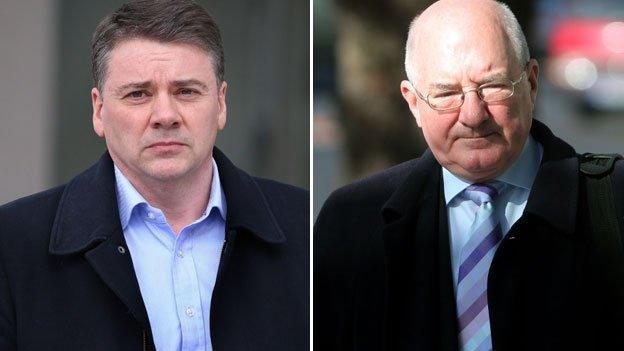Anglo trial: Pat Whelan and Willie McAteer get community service
- Published

Pat Whelan and Willie McAteer will serve 240 hours of community service after a high-profile trial that followed the collapse of the bank they helped to run
Two former Anglo Irish Bank bosses convicted of making loans to illegally prop up the bank's share price have been given community service sentences.
Pat Whelan, Anglo's former head of lending in Ireland and former finance director Willie McAteer were found guilty by a Dublin court in April.
The high-profile trial followed the collapse of the bank, which cost Irish taxpayers more than 30bn euros (£25bn).
The pair will now complete 240 hours of community service, in lieu of prison.
Government bailout
Anglo Irish Bank was once one of the leading lights of the Republic of Ireland's Celtic Tiger economy but its rapid fall from grace at the height of the financial crisis played a significant part in the near bankruptcy of the state.
Anglo was heavily exposed during the property price crash and was the first Irish bank to seek a government bailout in 2008.
The taxpayer rescue of it and other Irish banks eventually led to the government having to ask the International Monetary Fund and the European Union for a 85bn euros (£67m) bailout in 2010.
Thursday's community service sentences were not unexpected because when Whelan and McAteer were convicted, the trial judge ruled that jailing them would be unjust.
He said the pair believed they had acted lawfully over the controversial loan arrangements.
High risk transaction
The judge criticised the Republic of Ireland's financial regulator for failing to stop the share price deal and said it appeared that the state agency had led the defendants into error and illegality.
Whelan, of Malahide, County Dublin, and McAteer of Rathgar, Dublin, had denied the charges against them during their trial at Dublin Criminal Court.
They were involved in making illegal bank loans to 10 of Anglo Irish Bank's wealthiest customers - who became known as the Maple Ten - in July 2008.
They made the arrangements due to fears the bank's share price was about to collapse because of an earlier, high risk transaction involving the country's then richest man, Seán Quinn.
Mr Quinn, a County Fermanagh-born businessman, had taken a complicated financial bet that meant he, in effect, controlled 25% of Anglo Irish Bank's shares.
When he lost the bet, there was the prospect that Mr Quinn would have to dump his huge shareholding on the market, causing the bank's share price to collapse.
The bank's response was to get the Maple Ten to buy his shares.
However, they lent Anglo's money to the investors to buy the shares, on favourable terms.
Company law
Loans were also provided to other members of Mr Quinn's family to take up some of the shares, although those loans were later ruled to be legal.
At the time, the deal had the desired effect and helped stabilise the bank.
However, the Maple Ten loan arrangement was a breach of company law, which prevents a firm lending to a customer with the intention of affecting its own share price.
The case was the first prosecution of offences under section 60 of the Republic of Ireland's 1963 Companies Act.
During the trial, their co-accused Sean FitzPatrick was cleared of illegally supporting the bank's share price.
Mr FitzPatrick was the former chief executive and later chairman of Anglo Irish Bank.
Community service
The 240 hours is equivalent to six weeks of average working weeks and is the maximum community service sentence a judge can impose.
No specific indication was given of the nature of the work to be carried out by the men, but it could include anything from graffiti removal, to helping with voluntary clubs, gardening, or recycling projects.
- Published29 April 2014
- Published17 April 2014
- Published17 April 2014
- Published17 April 2014
- Published15 April 2014